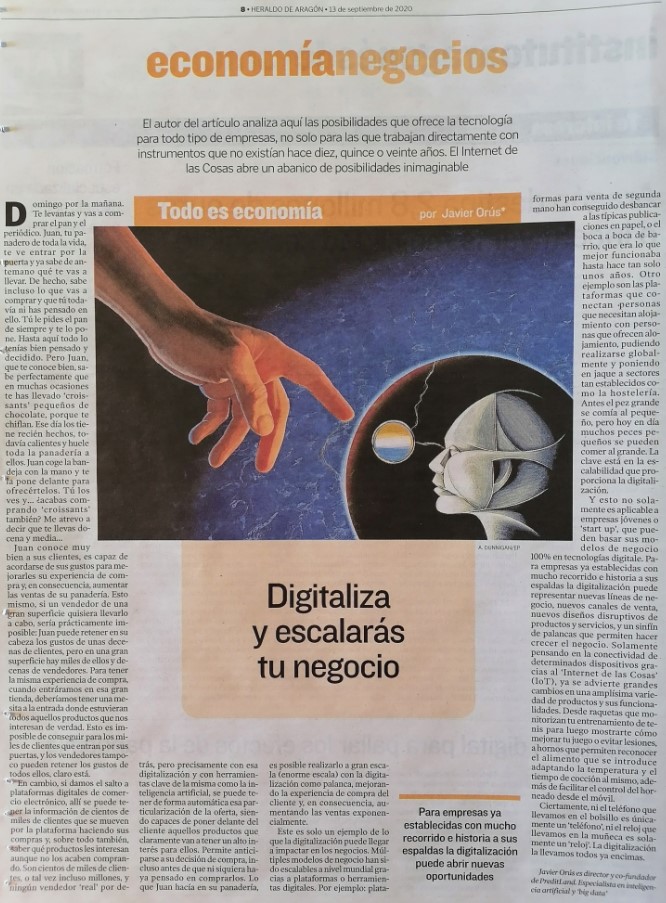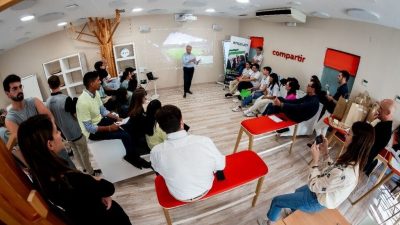Here is the new article written by our Director and Co-Founder Javier Orús Lacort for the Economy and Business section of the Heraldo de Aragón, published on September 13, 2020.
We hope you like it!

We reproduce here the published text:
Sunday morning. You get up and go to buy bread and the newspaper. Juan, your lifelong baker, sees you walk in the door and already knows in advance what you’re going to get. In fact, he even knows what you’re going to buy and you haven’t even thought about it yet. You ask him for the usual bread and he brings it to you. Up to this point you had everything well thought out and decided. But Juan, who knows you well, knows perfectly well that on many occasions you have taken small chocolate croissants, because you love them. That day he has them freshly made, still warm and the whole bakery smells of them. Juan takes the tray in his hand and puts it in front of you to offer them to you. You see them and… you end up buying croissants too? I dare say you get a dozen and a half?
Juan knows his customers very well, he is able to remember their tastes in order to improve their shopping experience and, consequently, increase the sales of his bakery. If a salesperson in a department store wanted to do the same thing, it would be practically impossible: Juan can retain in his head the tastes of a few dozen customers, but in a department store there are thousands of them and dozens of salespeople. To have the same shopping experience, when we enter that big store, we should have a small table at the entrance where all the products that really interest us are located. This is impossible to achieve for the thousands of customers who enter through its doors, and the salespeople cannot retain the tastes of all of them, of course.
On the other hand, if we make the leap to digital e-commerce platforms, there you can have the information of hundreds of thousands of customers who move through the platform making their purchases and, above all, you can also know which products interest them even if they do not end up buying them. There are hundreds of thousands of customers, or maybe even millions, and no “real” seller behind them, but precisely with this digitalization and with key tools such as Artificial Intelligence, you can automatically have that particularization of the offer, being able to put in front of the customer those products that are clearly going to have a high interest for them. It allows you to anticipate their purchase decision, even before they have not even thought about buying them. What Juan was doing in his Bakery, it is possible to do on a large scale (huge scale) with Digitalization as a lever, improving the Customer’s shopping experience and, consequently, increasing sales exponentially.
This is just one example of how digitalization can impact businesses. Multiple business models have been scalable worldwide thanks to digital platforms or tools. For example: platforms for second-hand sales have managed to unseat the typical paper publications, or the neighborhood word-of-mouth, which was what worked best until just a few years ago. Another example are the platforms that connect people who need accommodation with people who offer accommodation, being able to be carried out globally and putting in check such established sectors such as the hospitality industry.
In the past, the big fish ate the small fish, but today many small fish can eat the big fish. The key is the scalability that digitalization provides.
And this is not only applicable to young companies, or startups, which can base their business models 100% on Digital Technologies, but also for established companies with a long history, Digitalization can represent new lines of business, new sales channels, new disruptive designs of products and services, and an endless number of levers that allow the business to grow. Just thinking about the connectivity of certain devices thanks to the “Internet of Things2 (“IoT”), we can already see major changes in a wide variety of products and their functionalities. From rackets that monitor your tennis training and then show you how to improve your game or avoid injuries, to ovens that recognize the food being introduced and adapt the temperature and cooking time to it, in addition to facilitating baking control from your cell phone.
Certainly, neither the phone we carry in our pocket is just a “phone”, nor the watch we wear on our wrist is just a “watch”. Digitalization is already on all of us.



